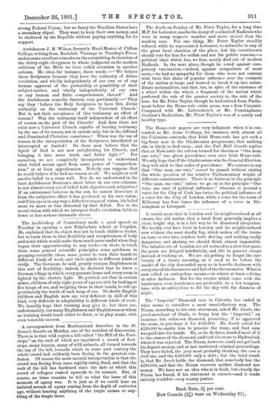Archdeacon J. M. Wilson, formerly Head-Master of Clifton College, writing
from Rochdale Vicarage to Tuesday's Times, makes some excellent remarks on the astonishing declaration of the thirty-eight clergymen to whose judgment on the modern criticism of the Bible we have called attention in another column. He cites, for instance, these words :—" We believe these Scriptures because they have the authority of divine revelation, and wholly independently of our own or of any human approval of the probability or possibility of their subject-matter, and wholly independently of our own or any human and finite comprehension thereof." And the Archdeacon remarks thereon, very pertinently :—" They say they believe the Holy Scriptures to have this divine authority on the testimony of the Universal Church.' But is not their acceptance of this testimony an effort of reason ? Was the testimony itself independent of all effort of reason on the part of the Church? And does there not exist now a Universal Church capable of bearing testimony by the use of its reason, not in synods only, but in the diffused and illuminated Christian conscience ? When was the use of reason in the interpretation of the Scriptures interdicted or interrupted or limited ? Do these men believe that the Spirit of God is not now enlightening his Church, and bringing it into more truth and fuller light ? " For ourselves, we are completely incompetent to understand what belief means apart from some power of "comprehen- sion," or at least apprehension. Nobody can suppose that heuould believe if he had no reason at all. We might as well ascribe belief to a stone wall. Nor do we understand in the least Archdeacon Denison's short letter in our own columns. Is not almost every act of belief both objective and subjective ? If an astronomer believes in the sun, he cannot dissociate it from the subjective effect it has produced on his own vision ; and if his eye is in any way a defective organ of vision, his belief must be more or less distorted by that defect. Nor is the moral vision with which we interpret God's revelation liable to fewer or less serious chromatic errors.


































 Previous page
Previous page